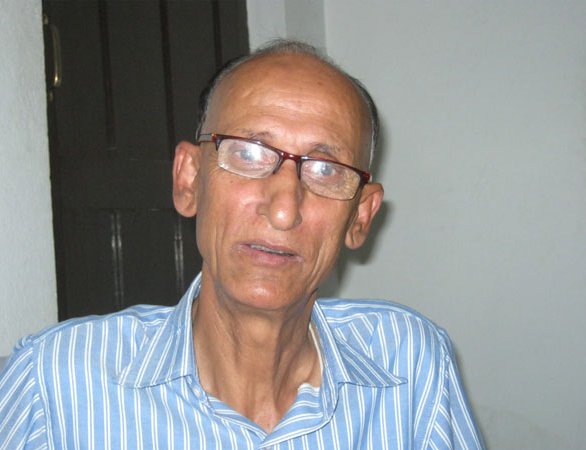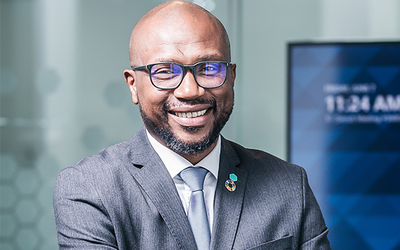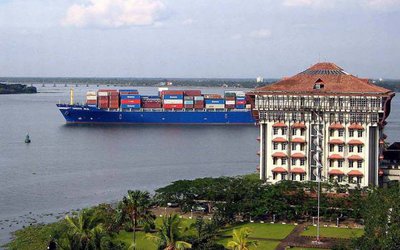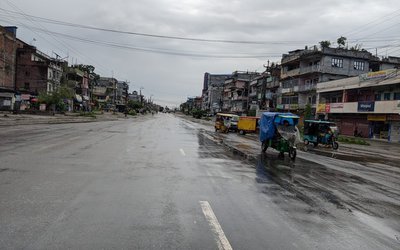
PITAMBAR PRASAD ACHARYA, Executive Director of the Development Project Services Center (DEPROSC- Nepal), is a well-known name in Nepal's development and microfinance sector. At a time when the contributions made by foreigners in the success of Nepali people are being lauded, Acharya stands as a proud Nepali, who has made a difference in the area of poverty reduction through micro-finance. Acharya’s interview excerpts:
Since you are one of the pioneers in establishing a micro-finance institution to eradicate poverty, tell us about the state of micro-finance now.
In the beginning, we were quite successful to run the micro-finance institution. However, the situation has been getting worse in the sector over the last few years. After the induction of trade unions in micro-finances, including in the NGOs, the situation has deteriorated. In my case, trade unions have not been working as per their mandate. This hampers the process of expansion of micro-finance. I am not opposing trade unions. What I want to stress is that they must follow their own norms and act beyond individual and sup-group interest. Our experiences have shown that micro-credit is one of the most successful medium to achieve poverty reduction. We have been running micro-finance for the last 16 years. Even during the conflict period, we were very successful to operate the micro-finance schemes. It is unfortunate now that the environment is not conducive for its expansion. We are running our institutions as they were three years ago. I do not say that nothing is happening, but what I can say that our progress is much slower now. If trade unions think of programme, this sector will expand further. Micro-finance has remained one of the core programs since the beginning. Microfinance is one of the means to bring the poor out of poverty. As long as trade union organizations work as sister organizations of political parties, nothing will be possible. They need to work professionally. I am in the micro-finance sector since 1996. I started my work from Bariyarpur and Potiyahi village of Rautahat district.
What are the challenges now?
One of the challenges before us is to discipline the trade unions. If they continue to create troubles, nobody will come to put their money with our institutions. The management cannot do anything to expand the micro-credit in a situation when the trade unions appear as radical and anarchist. If the state cannot help us, I will not be able to do much as an individual. It is unfortunate that the state is not helping us. The state needs to intervene to maintain good governance in micro-finance sector. Due to non-cooperation and threat from trade unions, we are unable to perform the audit. Trade unions have been saying that they will create obstructions in the audit until their demands are fulfilled. You can understand what would be the situation of financial institutions without the annual audit. Frankly speaking, we cannot do anything without the cooperation of state in the present context. Actually, the money collected by us is the money of the people and the state. We are collecting the savings from the people and getting the loans from individuals and various institutions. If we cannot move smoothly and with discipline, this will definitely hamper micro finance. Thus, what I want to say is that Nepal Rastra Bank, as a regulatory body, should support us to discipline the trade unions.
We want to make micro-finance sector more productive and poor oriented. We still want to work in the remote parts of Nepal.
It is globally proved that micro-finances can help reduce the rural poverty. As a person working in the micro-finance sector for the last one and a half decade, what does your experience say?
Of course, micro-finances will be key factors in reducing poverty. The situation in the rural areas has changed now. Till a decade ago, there were only a few micro-finance institutions. There has been a mushrooming growth of micro-finance institutions over the years. However, most of them are city-centric and they are yet to go to remote and rural parts of the country. The environment has further deteriorated due to unhealthy competition. We are yet to go to mountains and Himalayan region. Microfinance is not a charitable, but a social business. We cannot go in mountains and Himalayas due to heavy cost involved in it. Nobody will go to such remote areas without the support from the government. The operation cost of rural areas is high. There must be a clear-cut policy, how the government would like to support for its expansion in those areas. The state has to fix everything, including the salary. We are ready to pay the salary and other benefits as fixed by the state. What we want is a conducive environment. We can make a lot of difference to uplift the rural life. Micro-finance also helps to empower the women and change the education and health status. In rural areas, the lending sector is major area of exploitation. After implementation of micro-finance scheme, such exploitation also comes to an end.
How do you look at the role of the trade union?
Due to trade unionism, we are facing difficulties in carrying on with our expansion program. We are very much worried with the situation. DEPROSC-Nepal is an NGO. However, there are three trade unions within it. We are facing difficulties in dealing with them. You cannot plead for all unions. There are contradictory views. Trade unions are now affiliated to political parties and they work as party sister organizations. Moreover, trade unions bargain against the minimum regulatory process like statutory audit. Tell me how we can work in such a situation. If we transfer staff, they decline to go new places. The state needs to intervene to discipline the trade unions.
What is the state of DEPROSC?
There are 52,000 clients under DEPROSC micro-finance. We have also a bank which was opened ten years ago. The bank is functioning well. We have a transaction of 1.1 billion rupees. Out of this, Rs. 400 million is the deposit from the public money. We have also taken loan from commercial banks to invest in rural Nepal. The loan invested by micro-finance produces a major contribution in enhancing production, and eradicating poverty. However, we need a conducive environment to expand our programs. This is the reason we are calling for intervention by the state.
In how many districts is DEPROSC working now?
We have been running micro-finance in 11 districts. We have been implementing development programs in other 20 districts. Under the partnership with NABIL bank, we are investing the money in rural parts. With support from various organizations, including NABIL, DEPROSC and other NGOs, we have raised 160 million rupees in capital and applied for Nepal Rastra Bank registration. However, our proposal has been pending in the bank for last three years. With the paid up capital of 160 million rupees, we want to establish NADEP bank. Our aim is to institutionalize the micro-credit by DEPROSC. We are yet to get the permission. We hope Nepal Rastra Bank will give us the permission in time. We have already completed the process needed to get the permission for a bank. It is Nepal Rastra Bank to decide on it. As soon as Nepal Rastra Bank issues permission, we will start to provide services in the remote rural parts of Nepal. We will also work in nine remote districts classified by Nepal Rastra Bank.
Since you have been providing such a large number of employment opportunities and serving the poor people, how do trade unions come here?
The present trade union act says that employees can form a trade union in an organization having eight employees or more. It is the right of every employee to open the trade union. I warmly welcome their presence in the office. However, they have to work as an organization protecting the interest of trade unions not as a bargaining hub for an individual, sub-group and sister organizations of the political parties. I am not against the trade unions, if they support management to enhance the quality and make it more transparent. I am only against the undisciplined act in the name of trade unions. There must not be politicization of trade union work.
Having spent such a long time serving the people, don't you get upset when your work is disrupted by undisciplined workers?
I don't feel anything bad in the day time. When I go to bed, I feel upset, not because of trade unions, but because of my inability to expand our programs in rural and remote Nepal. Had I been allowed to work smoothly, our institutions would have reached in many rural parts of Nepal. It is very sad to see trade unions are even obstructing the audit. How can you raise funds without an audit? Everybody wants audit report to fund us. I was trapped in an odd situation.
You have been working in rural parts of Nepal serving the interest of people? Why do political parties obstruct your program?
In my whole life, I have been involved in a number of programs, and my projects are always apolitical. We invite the representatives of all political parties in our programs. I would like to appeal to all political parties not to treat trade unions as their sister organizations. They should not be made something like student unions. The country will suffer a lot if there is such damage. We used to have 700-800 employees in DEPROSC, but we have now little more than 300. Due to disruptions created by trade unions, 500 people have lost the employment opportunity. Even we are not pretty sure whether our programs will move or not. Last year, our offices were shut down for 120 days. We want a conducive environment for work and support from Nepal Rastra Bank.
Despite all difficulties, we have been working. We are moving to mid-western region with food program. We have a whole system and institutions. If somebody asks us to go to Karnali, we can revive our institutions there. We have a strong capacity and manpower with us. We need to go for rural and remote parts of Nepal. That is our vision. NGOs should go to rural parts of Nepal. Our targets should be the areas where the government fails to reach.
How do you view the future?
If the present trend of trade unionism continues, it will have far reaching consequences in the areas of microfinance. It is very sad that we are unable to implement our poverty alleviation programs because of obstruction by the trade unions. I have been requesting the friends in trade unions to follow their work ethics. We are not getting support from trade unions. It is unfortunate that even the state is not supportive our case.
What about your bank?
Since the last three years, I have been visiting Nepal Rastra Bank time and again, making efforts to open another micro-finance bank. It is very sad that Nepal Rastra Bank is yet to permit me. We are expecting that the central bank will issue a license to us.
- MELAMCHI WATER SUPPLY: No Interruption During Monsoon
- Jun 25, 2025
- KOREAN RETURNEES: Successful Integration
- Jun 25, 2025
- UPPER TRISHULI-1: Engaging With Local
- Jun 25, 2025
- IME GROUP: Twenty Five Years Of Journey
- Jun 24, 2025
- NEPAL’S AIR POLLUTION: A Growing Health Concern
- Jun 24, 2025















